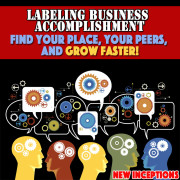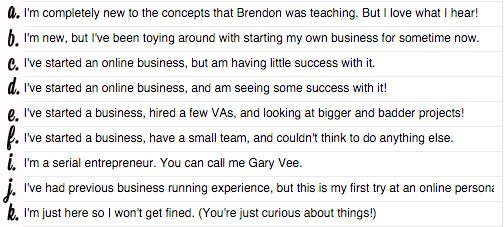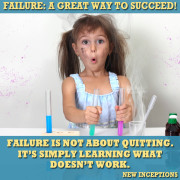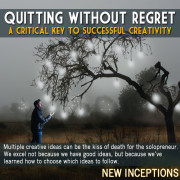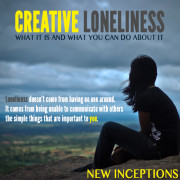Labeling Business Accomplishment: Find Your Place, Your Peers, and GROW Faster!
With all the business training going around these days and the interaction of people at all levels of business, many business trainers have tried to label where people are by using a scale or other descriptive words to illustrate where people might be on the entrepreneurial path.
In Fizzle, for example, they have a roadmap to developing one’s business that contains three distinct phases that I chatted briefly about in this post few weeks ago. These 3 phases describe those who are starting their business:
- Phase 1: Clarity stage (Figuring out what you want to do.)
- Phase 2: Building Your Business (Building it enough that it replaces your day job financially).
- Phase 3: Scaling (Fine tuning, adding paid team members, and growing larger than what you could do on your own)
While these three phases work out really well for Fizzle because they’re all about getting us from nothing to something, I believe it’s 3/4’s of the full story. Plus, as for the overall business world, there should be a description to describe those who have reached a high level of their own growth and are strictly focused on helping others grow. John Maxwell would call these Level 5 Leaders. Some of those folks might include serial entrepreneurs, gurus, angel investors, philanthropists, and advisors. Again, think more like Tim Ferriss, Pat Flynn, Gary Vee, on to someone like Oprah.
Essentially, people that wouldn’t be using Fizzle because they would have outgrown it.
For about a month, I’ve been trying to come up with a more generic ranking in helping people quickly understand where people are in the business world.
Finding the Solution
In a recent poll that I conducted on Facebook, I asked the members of a group where they fell in building their business. I wanted to find out where people were so that we could find out the makings of the group. This would lead us to reach out to those that were in similar levels and also figure out who we could reach up to for help.
Here was that poll:
Besides the fact that I realized that I apparently don’t know how to use the alphabet (what happened to g and h?), I found out that all of these levels were being used to describe where people were in the group. Many were new and hadn’t started even building a platform (groups a and b), while a few were starting their business and had some success (groups c and d). Yet, others were having more success and scaling (groups e and f). Even more interesting, is that there are folks in the group that have had more than just success with online business, they’ve started a few businesses online and could be straight up veterans. It’s really hard to tell why those people are in the group. Networking? Sure.
Now, as far as the first three segments – I think you can describe those as the Clarity, Building, and Scaling segments from Fizzle. But what about that 4th group? I had to figure out something that could describe all 4 groups. And that’s when it hit me.
Why not use the labels that we’re all so familiar with when it comes to accomplishment in the scholastic world? I mean, it makes sense.
Let’s Look at Some Definitions:
Why does it make sense to use these terms that a lot of us might want to forget? Well it’s because they actually have appropriate meaning! Check this out:
The term Freshman dates back to the mid-16th century where it has invariably meant either “newcomer” or “novice.”
Sophomore is derived from two Greek terms, sophos, meaning “wise,” and moros, meaning “foolish” or “dull”. Meaning that the term Sophomore originally probably meant a wise moron! (I would definitely say I fit this rank right now. I know a lot of stuff, but I’m not exactly sure when to use it all!)
Junior simply means the younger of two. This is defined in relations to their more learned upperclassmen. Early on, juniors were called “Junior Soph,” and seniors were denoted with “Sophester”.
Senior has been used since the mid-14th century in English to denote either an older person or one of authority.
Cool, huh? Easily fits the different groups of folks in the group!
Check this Out
So here’s something else that I realized. When it comes to business, most people when they jump from one business to another have to start over again. As upcoming podcast guest Theresa French said in her interview, “going from one business to another type of business is just as hard as going from working a job to a business”. So, if that’s the case (which I’m pretty sure it is), then that would mean that those that start something new, are freshman again. (Makes sense, this is how college works.)
However, because they’ve already gotten their feet wet in business, I’d think that it’d be more suiting to call them sophomores again. They have skills, they just don’t know how exactly to apply them yet.
Grow Faster by Working with your Classmates!
Ok, so now that you’re familiar with these terms, why is it important? Because, it’s almost ALWAYS something that industries do – come up with their own words to describe something that might be complex to others outside of that industry.
Just like academia, the rules of business stay the same. What changes is the knowledge used for a particular business and how we execute in our industry. The catch is, as solopreneurs, we all have varying degrees in how well we’re doing both.
Typically speaking, the more experience we have, the more we’ll know how to wield both knowledge and execution. Labeling these levels of experience helps us determine whether we’ll be using our time effectively with the other person.
Freshman always want to learn from upperclassmen. However, working with seniors all the time might not be the best thing for them.
While it’s good for both parties to be around each other from time to time to expand each other’s point of view, there is a ton of work between a freshman and a senior. Just like in high school and college, the freshman gets frustrated that they can’t keep up and the senior gets frustrated when the freshman just doesn’t get it.
We have to learn from the upperclassmen, but practice with those who are our peers.
Action Steps
So this is a fairly simple activity. Figure out which level you’re at and connect with those that are close to you in experience. Perhaps even start a “study group” (aka mastermind) with them! (Just like when you’re studying, you’ll learn things much quicker from different perspectives than if you were to just go it alone.)
Are you a freshman? A sophomore? Maybe even a junior? Who are the seniors in your life? Are you learning from their path of success and how to apply things they’ve learned on your own journey?
Have you made already made a mastermind of peers that you can grow together with? If you have, that’s great! You know that iron sharpens iron. If you haven’t, think about who you’d want in that group. Freshman don’t tend to care who they study with, however, it might be best to start out with other freshmen or sophomores. Anything higher and you might find yourself drinking from a fire hose.
As a sophomore, a junior, or even a senior, you have to be picky not to get too many lowerclassmen in your group. Otherwise it doesn’t do YOU any good! Don’t let your niceness weigh you down. You’re not doing them or yourself any favors!

